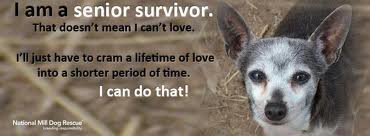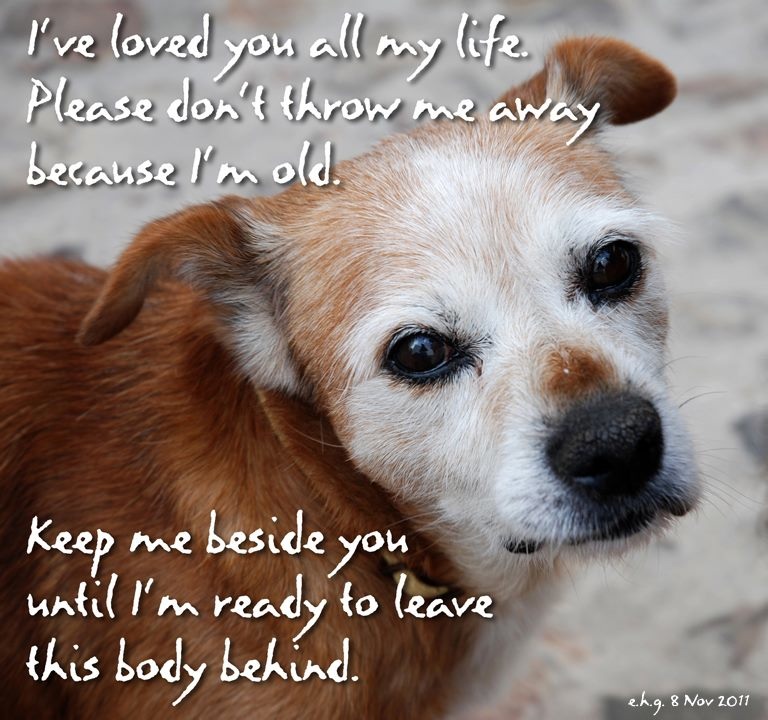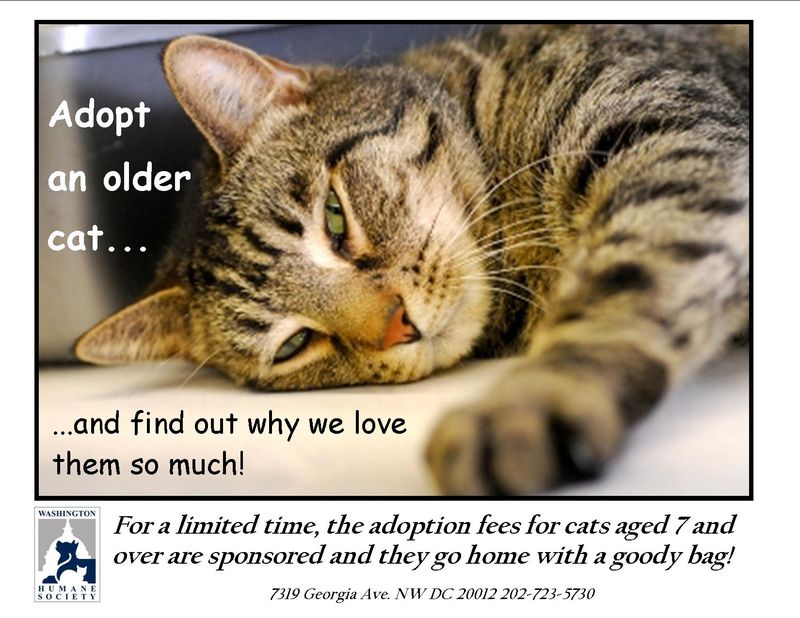Caring for Senior Pets
Aging pets have unique needs that require special care and attention. They are at risk for developing conditions such as cancer, diabetes, and other disorders of the skin, thyroid, joints, kidneys, and heart.
Common problems seen in older pets include dental disease, orthopedic problems, obesity, and changes in behavior. These behavior issues may be improved with a combination of training, medication, and even diet. Physical therapy and acupuncture may also help pets with arthritis and other age-associated issues.

When is Your Pet Considered a Senior?
Just as no two pets are alike, “senior” status varies according to breed and your pet’s life experiences. Generally, dogs over the age of 8 years are considered seniors. Giant breeds like Mastiffs or Great Danes achieve this status sooner, while toy breeds may not be considered senior until they are 9 or 10. Cats are classified as seniors when they reach the age of 10 years.
As your pet ages, possible health problems such as:
- Arthritis
- Kidney and liver function
- Heart disease
- Diabetes
- Thyroid problems
- Parasites
- Hypertension
Senior Dogs

Older dogs can face unique challenges such as:
- Arthritis and Joint Pain: Movement may become painful due to arthritis or conditions like hip dysplasia. We take extra care to handle geriatric pets gently to avoid discomfort.

- Vision Impairment: Impaired vision or blindness may become apparent, especially in low lighting. Conditions like sclerosis or cataracts may cause cloudiness in their eyes. Speaking to your dog and using hand signals can improve communication.
- Cognitive Dysfunction: Some older dogs may experience mental disorientation, wandering aimlessly or getting stuck in corners. They may bark excessively at nothing or seem restless. Keeping these pets confined to safe areas and using medications may help.

- Hearing Loss: Dogs may develop partial hearing loss or deafness. They may not greet you immediately when you come home but may respond to floor vibrations or door sounds. Older dogs tend to experience deeper sleep, making them harder to wake.
The sense of smell usually remains good in senior dogs. If you hold out your hand for them to sniff, they will usually recognize you by your scent.
Senior Cats
With proper care, cats can live into their late teens or even twenties. However, older cats may face common challenges such as:
- Behavior Changes: Older cats may become more withdrawn or experience disrupted sleep patterns.
- Digestive Changes: Aging cats may have difficulty digesting nutrients, requiring dietary adjustments.
- Skin and Coat Changes: Brittle nails and a decrease in coat quality are common signs of aging.
It is recommended that older cats receive checkups twice a year, as they age more rapidly than humans. Routine lab tests can identify issues early, improving management outcomes. Common diseases in older cats include diabetes, chronic renal disease, hyperthyroidism, inflammatory bowel disease, and arthritis.

Specialized Care for Senior Pets
We take special precautions when caring for senior pets to ensure their comfort and well-being:
- We always speak to pets before touching them to avoid startling them.
- Blind pets are guided with verbal reassurance to help them navigate.
- For arthritic pets, we move slowly and carefully to prevent discomfort.
Tips for Senior Pet Care
- Litter Boxes for Cats: Provide low-sided litter boxes or steps to help arthritic cats access their litter area easily. If accidents occur, consult your vet about potential urinary tract or kidney issues.
- Wee Wee Pads for Dogs: These can help prevent accidents when older dogs struggle to go outside in time.
- Proper Nutrition: Ask your vet about tailored diets for older pets to ensure they receive appropriate nutrients.
- Weight Management: Maintain gentle exercise routines for older dogs to prevent obesity and reduce arthritis strain.
- Regular Checkups: Schedule consistent vet visits for early detection of potential health problems.
- Dental Hygiene: Brush your pet’s teeth regularly or use dental products recommended by your veterinarian.
Providing Love and Care
Despite aging challenges, senior pets can continue to live happy, fulfilling lives with the right care. Offering your aging pet plenty of love, attention, and comfort helps them feel secure and cherished.
Adopting an older pet can be deeply rewarding. These pets still have so much love to give, and providing them with a warm, safe home is a beautiful way to ensure their golden years are filled with happiness and care.
Arthritis is a condition that causes the roughening of joint ends, leading to pain and discomfort during movement. Some older pets may have experienced Hip Dysplasia earlier in life, which can worsen with age.
When caring for pets with arthritis or other joint issues, it’s important to handle them with extra caution. Pets may cry out in pain or even react defensively if their joints are touched. To ensure their comfort and safety, always move slowly and gently when assisting an elderly pet. This careful approach can help prevent injuries and make them feel more at ease.

Some pets require special foods to either lose or maintain their weight or manage other health issues.

Accidents can happen. Older cats and dogs may occasionally soil floors and carpets if their nature calls are urgent and they cannot get outside or reach a litter box in time. Pet-Sitters are patient with your seniors, and do not admonish them.
The most important thing is to continue lavishing an abundance of love on your aging pets. They thrive wonderfully, knowing that pet-sitters are there for them, giving them a sense of security, especially when they may feel anxious about their owner’s departure.
You will be asked to sign a waiver for emergency animal care, and it will permit pet-sitters, if necessary, to rush your pet to the closest Vet hospital for care if needed during its visit. This form is signed by every pet that they care for, that has a place for all emergency contact information and your vet’s location as well.
They are patient with your senior pet and always supply plenty of tender loving care.
Caring for Senior Pets: Helpful Tips for Their Golden Years
As pets age, their needs change. Here are some helpful tips to ensure your senior pet remains comfortable, healthy, and happy during their golden years.
Litter Box Solutions for Senior Cats
Cats can develop arthritis, making it harder for them to climb into high-sided litter boxes. Providing a lower-sided box or adding a small step can make bathroom visits easier. Since urinary tract infections and kidney problems are also common in older cats, consult your veterinarian if you notice accidents or litter box avoidance.
House Soiling Solutions for Senior Dogs
Wee Wee pads can be a helpful solution for older dogs that may struggle to hold their bladder for extended periods. These pads provide a convenient and clean option to prevent indoor accidents.
Nutrition and Food
Consult your veterinarian about the best diet for your senior pet’s specific health needs. Higher-quality foods with proper nutrients can help maintain their well-being. Avoid economy or low-cost pet foods, as these may lack essential nutrients.
For dogs, table scraps should be avoided to prevent weight gain. If you enjoy giving your dog treats, consider switching to low-calorie options like carrot sticks, apple slices, or green beans.
Weight Management
As pets age, they may become less active, which can lead to weight gain. Maintaining a light exercise routine, such as short daily walks, is important. Obesity can worsen arthritis and other health concerns, so keeping your pet at a healthy weight is key.
Regular Veterinary Check-Ups
Routine vet visits become even more important as pets grow older. Your veterinarian can recommend how frequently your senior pet should be examined based on their health and age. Catching health issues early can significantly improve treatment outcomes. If you notice any concerning signs between check-ups, don’t wait — schedule a visit right away.
Dental Hygiene
Dental health is often overlooked but is crucial for older pets. Brushing your pet’s teeth regularly can help prevent dental disease and discomfort. Special canine or feline toothpaste, applied with a cotton swab or toothbrush, is recommended.
Embracing Senior Pets
While senior pets may require extra care, their companionship is just as rewarding. Don’t let their age discourage you from adopting an older cat or dog — they can become loving and devoted members of your family. Providing a warm home for an aging pet ensures they spend their remaining years feeling secure, cherished, and loved.
The bond formed with a senior pet is incredibly special — a testament to the many wonderful years you’ve spent together. Supporting them through their golden years is a heartfelt way to show gratitude for their loyalty and love.
